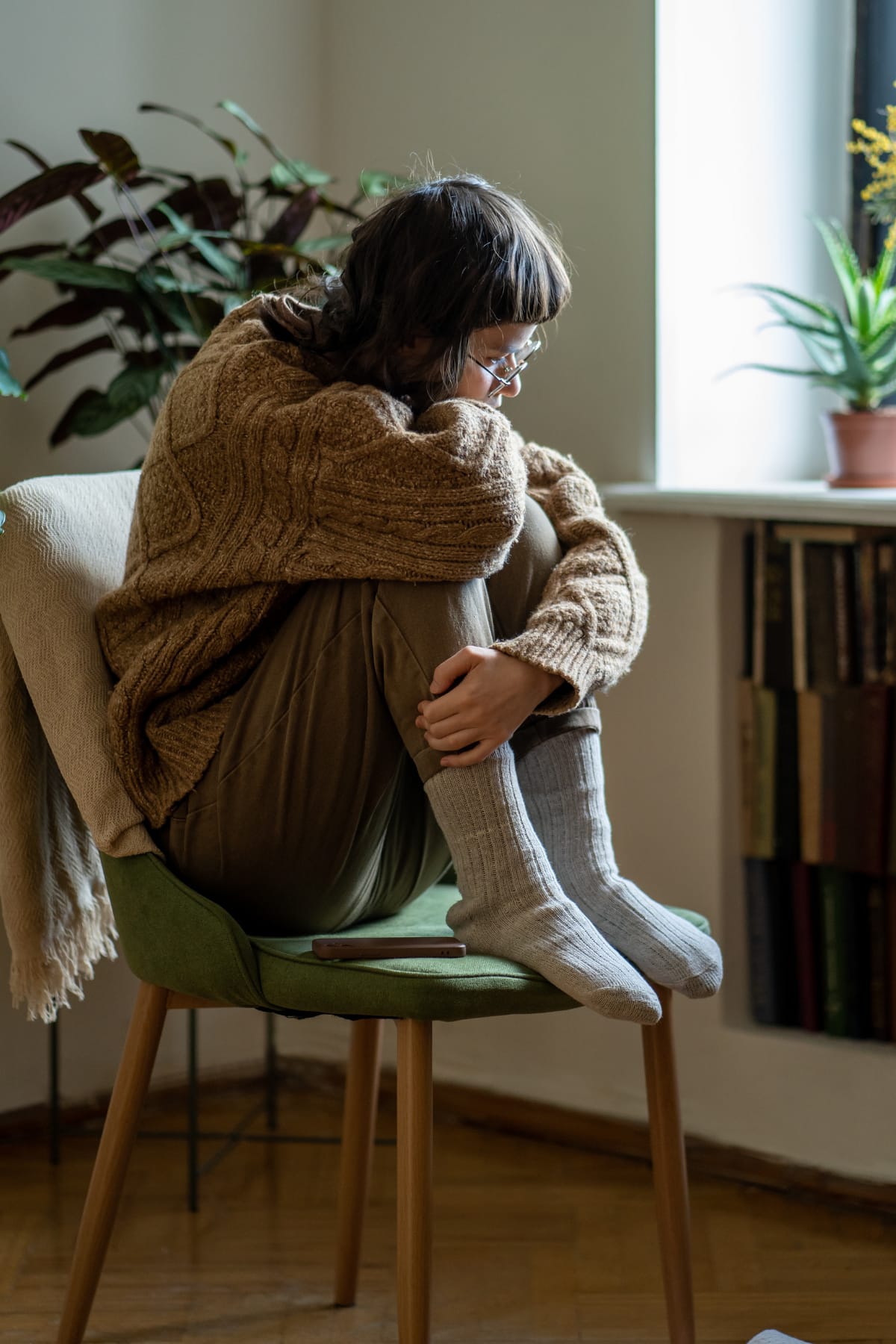
This post may contain affiliate links. For more information, read the full disclosure here.
Do you feel alone and unwanted? You are not the only one! Even though it sounds like a cliché, loneliness is a prevalent feeling among young and old alike.
Studies reveal that a lot of people are experiencing loneliness, making it all the more important to explore the reasons and find solutions.
It’s important to note that loneliness is not the same as being alone. Rather, it is the distressing feeling that arises when your social needs are not being met, either due to a lack of connections or a lack of meaningful interactions.
In other words, you can be alone and thriving in your own company, or you can be in a room filled with friends and acquaintances and still feel lonely and unwanted.
Experiencing loneliness can hugely impact your emotional state and overall quality of life. If you are wondering how to stop feeling alone and unwanted, the advice in this article will guide you through this tough time.
Why Do I Feel Lonely And Unwanted?
Humans are inherently social beings that live off of social interactions. Therefore, it is very common for everyone to get a bit lonely at some point in their lives. And that is absolutely normal!
However, when these feelings persist, you might want to search for a reason that triggers them. Some of them include:
- Negative Self-Perception: Low self-esteem and self-doubt contribute to feeling unwanted.
- Perfectionism: Striving for perfection in yourself or others can lead to dissatisfaction with real-life relationships, fostering a sense of loneliness.
- Rejection and Abandonment: Past experiences of rejection or abandonment can create emotional wounds of inadequacy.
- Social Anxiety: Fear of judgment and criticism can lead you to avoid social situations.
- Depression (or other mental health conditions): Distorted thinking patterns and a lack of motivation can intensify loneliness.
- Chronic Illness or Disability: Coping with a chronic illness or disability can lead to physical and emotional isolation, contributing to feelings of being unwanted.
- Social Exclusion: Being deliberately excluded or ignored by peers or social groups due to racial or cultural reasons can lead to feelings of isolation and being unwanted.
- Unresolved Grief: Grief and loss, especially if not properly processed, can contribute to prolonged feelings of loneliness and unworthiness.
- Trauma and Childhood Experiences: Past trauma and adverse childhood experiences impact self-esteem and self-worth.
- Big Life Changes: Major life changes, such as moving to a new city, starting a new job, or going through a divorce, can disrupt social connections and lead to feelings of isolation.
- Lack of Meaningful Connections: Superficial or unfulfilling relationships can leave individuals feeling empty and disconnected, even in the presence of others.
Exploring the reasons you are experiencing these emotions will help you discover how to stop feeling alone and unwanted in the most effective way for yourself.
The Impact Of Feeling Alone And Unwanted
One of the most meaningful acts of service you can offer yourself is to not disregard how you feel. Loneliness may seem like a harmless downgrade of your mood when, actually, it can greatly impact both your mental and physical health.
According to this comprehensive 2010 review, “loneliness is the social equivalent of physical pain, hunger, and thirst.” From ancient times, when isolation meant poor chances of survival, we have cultivated loneliness as part of a reflex that keeps us alive.
When we feel lonely, it’s our brain’s way of saying, “Hey, it’s time to connect with others!” This feeling can motivate us to build and maintain relationships, which are vital for our well-being and survival.
However, when this feeling becomes chronic, it is linked with decreased health and quality of life. Loneliness can affect our physiology, as well as how we feel, think, and behave in the long term.
Exploring how to stop feeling alone and unwanted is an act of self-preservation and self-care. Bringing these emotions to the light and confronting them with self-compassion and an open mind is the first and most important step on your healing journey.
Learn How To Stop Feeling Alone And Unwanted By Changing Your Life

Assess Your Emotions
As I mentioned above, recognizing how you feel is the most crucial step. Often, we disregard or deny our distressing emotions because we are afraid to face them.
Either because we find the truth uncomfortable or do not want to put in the strenuous effort to fix the situation.
However, denying these emotions can prolong your sense of loneliness and unworthiness. Remember that recognizing your emotions doesn’t mean you’re weak; it means you’re brave enough to confront them.
By doing so, you’re taking the first courageous step on the path to overcoming loneliness and finding a deeper connection with yourself and others.
Reframe Your Perception Of Loneliness
Learning how to stop feeling alone and unwanted doesn’t always include getting better at social interactions. Sometimes, it is best to reframe your mindset and grow comfortable in your own company.
Solitude carries a lot of stigma, and people who prefer to be alone are regarded as unwanted and non-conforming. However, being alone does not always have to be a negative thing.
You can reframe your loneliness to view it as a chance to spend time with yourself. Grasp this opportunity to deepen your connection with yourself, understand your thoughts and feelings, and explore the things you like. You can pick up a new hobby and expand your interests.
Time spent alone mindfully can fuel self-discovery and personal growth. Spending productive and enjoyable time alone can be much better than wasting your energy around people who make you feel lonely in their presence.
Take Good Care Of Yourself
Feeling alone and unwanted creates a rooted sense of unworthiness. When you are plagued by low self-esteem, it is more likely to feel unworthy of care and consideration.
This makes it easier to fall into a habit of “abandoning” your needs. It is also more likely to engage in self-harming or unhelpful behaviors like binge eating.
It is very important to resist the urge to neglect yourself. Self-care is a powerful antidote to loneliness.
Prioritize your physical and emotional well-being by maintaining a healthy lifestyle. Get regular exercise, eat nutritious meals, and ensure you’re getting enough rest.
You can also engage in activities that nurture your soul, whether it’s reading a favorite book, practicing mindfulness, or indulging in a hobby. By treating yourself with kindness and self-compassion, you’ll build resilience against loneliness.
Learn To Enjoy Your Time Alone
Mastering the art of enjoying your own company will help you discover how to stop feeling alone and unwanted. This might seem harder for extroverted individuals who thrive in social situations. Yet, alone time can become as enjoyable and fulfilling as any other company.
Without the motivation of someone else, it is easy to fall back and do nothing. Therefore, create a list of things you love doing, either inside or outside of the house. Weave these activities into your program to ensure that you will be motivated to do them.
The great advantage of doing things on your own is that you get to do what you want whenever you want it. It is a brilliant opportunity to explore your interests and expand your creativity.
Practice Gratitude
According to best-selling author Brene Brown, gratitude is the portal to happiness. This can apply to alleviating loneliness, too. The feeling of being alone stems from a sense of lacking meaningful connections.
Gratitude can help you shift your focus from what you are missing to the abundance that already exists in your life. It can shine a light on the things you may wrongfully take for granted.
It is crucial to regularly acknowledge the positive aspects of your life, no matter how small. Keep a gratitude journal where you jot down daily or weekly moments of appreciation.
This practice can elevate your mood and help you see the beauty in everyday life, reducing feelings of loneliness.
Make Meaningful Interactions
In an effort to find out how to stop feeling alone and unwanted, you may engage in superficial interactions. However, you might find that these relationships are emotionally draining and create a deeper sense of loneliness.
Prioritize finding like-minded people that share your interests and values. These people are more likely available to create deeper and more nourishing connections.
“To expand your social circle and foster meaningful connections, pursue your passions, attend relevant events and workshops, volunteer for causes you care about, explore online communities, engage in networking, join local clubs, take classes, leverage mutual friends, and approach social gatherings with openness and curiosity.”
Focus On What YOU Want From Others
Often, we become preoccupied with thoughts of how we can reshape ourselves to fit others’ expectations. This can foster the feeling of not being fully accepted and understood and exacerbate the feeling of loneliness.
A healthier approach is to find people who can appreciate and cherish your authentic self. Discovering your expectations and requirements within a relationship is important for cultivating deeper and more meaningful connections.
By spending time on your own and devoting yourself to self-improvement, you gain greater clarity about your identity, your needs, and what you deserve. This will allow you to establish firmer and healthier boundaries.
Detach Your Idea Of Self-Worth From External Validation
This is arguably the most important tip on how to stop feeling alone and unwanted. These negative emotions often stem from a place of unworthiness and low self-esteem.
Instead of sourcing your validation from others, practice self-acceptance and self-love to establish a self-replenishing idea of self-worth. Regardless of what people think of you, your value will not diminish.
Self-affirmation creates emotional resilience and a strong sense of self. You will find it less likely to conform yourself in relationships that do not align just for the sake of feeling accepted.

Find Something That Gives Your Life Purpose
Sometimes, the things we do for others bring a strong sense of purpose into our lives. This might be helping a friend in need, being there for family, or excelling at your job.
However, it’s just as important to explore what truly resonates with your own passions and values. For instance, finding purpose can be as simple as:
- Volunteering at a local animal shelter because you’re passionate about animal welfare.
- Starting a garden and nurturing it to see the beauty of growth and nature.
- Mentoring a young person to make a positive impact on their life.
- Pursuing a hobby like painting, where you create art that expresses your inner self.
- Joining a community group that focuses on a cause you deeply care about, like environmental conservation or social justice.
Regulate Your Social Media Exposure
This piece of advice on how to stop feeling alone and unwanted might seem a bit paradoxical. You would expect that social media provide an easy and accessible way to connect, and therefore, they offer a solution to loneliness.
However, seeing people socializing and enjoying time with friends may create a sense of FOMO. You may feel you are the only one experiencing isolation when you never really know what is happening in other people’s lives.
Not comparing yourself with people you know online is very hard. Therefore, it might be more practical to regulate your exposure to social media altogether. Allocate specific times a day and engage only with content that boosts your mood.
Adopt A Pet Friend
They say that dogs are a man’s best friend (I am sure this is true for all other lovely pets, as well). By adopting a pet, you create a bond of companionship and unconditional love.
You also add purpose to your life by undertaking the obligation to care for someone other than yourself.
Nothing compares to the feeling of returning home to someone expectantly waiting for you. Owning a pet also encourages you to get out of the house more often, while it offers an excellent opportunity for socializing on the street.
Share Your Experience With Someone
Due to past negative experiences, shame, or fear of rejection, many people avoid sharing their feelings with others. However, this self-isolation can trick you into believing that you are the only one going through this experience, which can only deepen your loneliness.
Opening up to a trusted friend or family member about your feelings of loneliness can be an enormous relief.
Sharing your emotions can pave the way for understanding, support, and a stronger sense of connection.
Try Therapy
Learning how to stop feeling alone and unwanted often includes asking for help and guidance. Reaching out to a therapist is never a sign of weakness but an act of ultimate self-love.
Therapy can provide valuable insights, coping strategies, and a safe space to explore and address the underlying causes of your loneliness.
Final Thoughts On Feeling Alone And Unwanted
The journey to overcoming loneliness and the feeling of being unwanted is a deeply personal and courageous one. It’s essential to recognize that you are not alone in experiencing these emotions; they are a common part of the human experience.
Loneliness can be triggered by various factors, from past trauma to life changes, but understanding the root causes is the first step toward healing.
The impact of loneliness on mental and physical health is significant, underscoring the importance of addressing these feelings with compassion and care.
Reframing your perception of loneliness, taking good care of yourself, and learning to enjoy your own company can be powerful tools in your arsenal against loneliness.
Practicing gratitude, seeking meaningful interactions, and focusing on what you want from relationships can help you build deeper and more fulfilling connections.
Detaching your self-worth from external validation and finding purpose in your life are essential steps in the journey toward self-acceptance.
Regulating social media exposure, adopting a pet, and sharing your experiences with trusted individuals can also contribute to your sense of belonging and connection.
Finally, seeking therapy is a valuable option, providing professional guidance and support as you navigate your path toward healing and wholeness. Remember, it’s okay to seek help and take the necessary steps to stop feeling alone and unwanted.
Your journey toward self-discovery and meaningful connections is a testament to your strength and resilience. Embrace it with open arms and the belief that you deserve the happiness and connection you seek.
